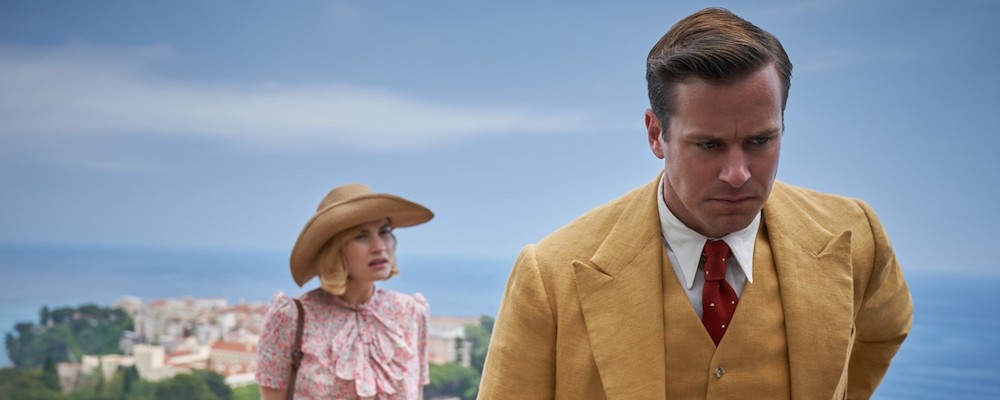Netflix Updates Daphne du Maurier’s ‘Rebecca’ From Gothic Melodrama To Glossy Soap
Alci Rengifo
The lastest adaption of “Rebecca” continues the ongoing trend of searching in the past for any classic ripe for a remake. It carries on its shoulders not one, but two renowned works. First, it’s based on the never-out-of-print novel by Daphne du Maurier and second, it follows in the footsteps of the legendary 1940 adaptation by Alfred Hitchcock, which won the Best Picture Oscar. How do you follow those acts? Netflix certainly makes the attempt by packing this new take with attractive faces, extravagant production design and a curious lack of bite.
The story remains intact. It’s the late 1930s and a young woman (Lily James) finds herself in Monte Carlo serving the pompous Mrs. Van Hopper (Ann Dowd). While suffering under the sun and sand, the assistant catches the eye of Maxim de Winter (Armie Hammer), a widower and one of the wealthiest men in England. The two hit it off and romantic sparks fly. Maxim decides to be bold and proposes, thus christening our heroine the new Mrs. de Winter. They move into Maxim’s vast estate, Manderley, where Mrs. de Winter is introduced to the staff, including Mrs. Danvers (Kristin Scott Thomas), the stone-faced housekeeper. Mrs. de Winter has to now adapt to the ways and customs of a grand house, while dealing with the lingering shadow of Maxim’s late wife, Rebecca, whose tragic death by drowning hangs like a ghost. Mrs. Danvers in particular clings to her loyalty to the dead Rebecca, making the new upstart feel alien in the vast estate. She will even sabotage any attempt by Mrs. de Winter to fit in. Meanwhile, Maxim is hiding his own secret about his wife’s demise.
Director Ben Wheatley sets out to make “Rebecca” into a glossy melodrama where you could even say ageism is the name of the game. In the novel and Hitchcock movie, Maxim de Winter is a slightly older rich man, played famously by Laurence Olivier. Mrs. de Winter was played by Joan Fontaine, who perfectly captured the youthful inexperience and sense of being intimidated that the character needs. In Wheatley’s version the cast looks more suitable for a YA daydream. Armie Hammer and Lily James look like they could have gone to high school together. The tension never becomes about a younger woman entering an older man’s more complicated world. In the Hitchcock version this guy has history and she doesn’t. On planet Netflix, they both look equally confused. Hammer, of the oil Hammers, is a natural fit of course in this opulent setting. No one needed to teach him how to behave in an elegant restaurant or feel comfortable in a large house, but at the same time he lacks the intensity of a man harboring a horrific secret. Maxim de Winter is a subtly ticking time bomb, a well-bred aristocrat silently going unhinged. Even when Mrs. de Winter makes an aloof mistake like letting Rebecca’s unsavory cousin, Jack Favell (Sam Riley), into the property, Hammer’s Maxim is too soft and low key. Kristin Scott Thomas is the only one who does a worthy update of her character, giving Mrs. Danvers the same kind of quiet menace Judith Anderson did so well in the original. Though it’s hard to even come close to the wide-eyed darkness Anderson evokes.
On its own what weakens the Wheatley “Rebecca” is that he tries too hard to say what doesn’t need to be said, or show what should only be hinted at. Hitchcock’s version was so eerie and powerful because he made a Gothic drama where Rebecca is an unseen presence through sheer memory and description. Wheatley wants to pump up the volume with Mrs. de Winters having odd hallucinations where she thinks she sees Rebecca running down a hallway, or catches Maxim sleepwalking towards Rebecca’s old, lavish bedroom. This story element is only used once and is never even properly revisited. Even the early scenes with Mrs. Van Hopper feel more comedic and goofy than anything else. She scoffs at Lily James because of her low class the way cartoon rich people do in movies. What all this amounts to is a ghost story without a ghost. By the third act there’s little steam generated in terms of plot. Fans of the book and other movie versions know the secret Maxim is hiding and how it connects to Rebecca’s death. But in this version it almost feels anti-climactic. The final moments involve a courtroom battle and Mrs. de Winter trying to get to the bottom of what happened with Rebecca are rushed. What in other films took its time with good, strong dialogue, here is reduced to Lily James doing some unconvincing thriller moves, like locking a door to snoop through a doctor’s files while other characters are about to burst into the building. Kristin Scott Thomas’s eternally obsessed Mrs. Danvers gets pushed to the side by the end, until the famous, fiery conclusion, which ends in this version differently with a needless, final dive into the sea.
Nonetheless “Rebecca” is nice to look at in a soap opera kind of way. Wheatley likes to shoot lots of bright exteriors and wide angles of cars going down roads, choosing for whatever reason to score the de Winters’ arrival to Manderley with The Pentangle’s 1968 track “Let No Man Steal Your Thyme.” Manderley has never been depicted this exuberantly, with art décor and reading rooms that look more fit for the Hammer Museum. Rebecca’s bed chamber seems like the kind of ultra-glossy spot where a glam rock star would take a nap.
Melodrama need not always be too serious. Even at its cheesiest it should be hot-blooded, with a hint of danger. Plainly said, “Rebecca” needs more passion. It has the look and dramatic music, but it holds back to the point of making us wonder what all the fuss is about.
“Rebecca” begins streaming Oct. 21 on Netflix.

